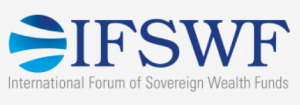Guyana becomes associate member of Int’l Sovereign Wealth Fund body
Guyana is now the latest associate member of the International Forum of Sovereign Wealth Funds (IFSWF). Formed in 2008, the IFSWF is a voluntary organization of countries with sovereign wealth funds committed to working together and strengthening the community through dialogue, research and self-assessment.
This newspaper understands that the associate membership application for Guyana’s Natural Resources Fund (NRF) was approved by the IFSWF Board on December 11, last.
Chief Executive of the IFSWF Secretariat, Duncan Bonfield said that the decision to approve Guyana’s application was based on the assessment that the nation’s Natural Resource Fund “had proven willingness to uphold the member undertakings as set out in the IFSWF membership agreement, including endorsing, on a voluntary basis, the Santiago Principles.”
The Santiago Principles consists of 24 generally accepted principles and practices voluntarily endorsed by IFSWF members. It seeks to promote transparency, good governance, accountability and prudent investment practices while encouraging a more open dialogue and deeper understanding of SWF activities.
The assessment by the Secretariat would be in stark contrast to criticisms which were spewed by the political opposition for over a year. The People’s Progressive Party has said that the Minister of Finance has too much control over the Fund, as he has to appoint members to key committees in charge of investments and withdrawals that would be made.
Along with hearty congratulations, Bonfield has since informed the Ministry of Finance that while there is no annual membership fee for associate member status, the usual expectation is that a fund will remain as an associate member for a maximum of three years before applying to become a full IFSWF member.
NRGI ADVICE TAKEN
In November 2018, Kaieteur News was the first to report one of the key pieces of advice offered by the Natural Resource Governance Institute (NRGI) to the coalition administration.
That transparency body had said that if the Government of Guyana is truly serious about ensuring that transparency and accountability are the underlying principles of the Natural Resource Fund (NRF), then it will seek without hesitation, to join the revered International Forum on Sovereign Wealth Funds.
The Natural Resource Governance Institute reminded that IFSWF members had agreed from the inception to have a set of principles called the Santiago Principles, and practices for Sovereign Wealth Funds.
The NRGI said that these principles, adopted in 2008, emerged from two fears: First, countries receiving Sovereign Wealth Fund (SWF) investments worried that large government investors might use their financial power to pursue political or strategic objectives rather than purely financial returns. Second, since SWFs are large and growing in size, failure of just one of the world’s largest SWFs could trigger a global financial crisis.
The Institute noted that the 24 voluntary principles are broken down into three sets of standards: legal framework, objectives, and coordination with macroeconomic policies; institutional and governance structure; and investment and risk management framework.
The transparency body said that they are meant to encourage SWFs to behave openly and predictably and to seek financial returns rather than support a foreign policy agenda. It said that openness, predictability and market orientation, in turn, are expected to ease recipient country fears of predatory investments and promote sound internal fund management.
NRGI stated, “Being a member of the IFSWF and agreeing to the Santiago Principles provides an incentive to publish key information, make clear the roles and responsibilities of key bodies and make decisions openly.
“Though the principles are voluntary, peer pressure and a desire to be perceived in a good light by the international community and by recipients of SWF investments can encourage compliance. In fact, there is evidence that belonging to the IFSWF may have a positive effect on fund transparency and governance.”
It added, “An examination of Economist and Fund Expert, Edwin Truman’s, SWF Scoreboard scores shows that members of IFSWF in 2012 improved their fund scores by 17 percent on average between 2007 and 2012, whereas those who were not members improved by only five percent on average.”
NRGI said that on the other hand, countries which are members of the IFSWF but who do not comply with the majority of the principles, such as Qatar and the United Arab Emirates, have seriously undermined their own international credibility.






















